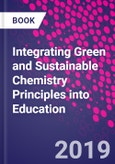Integrating Green and Sustainable Chemistry Principles into Education draws on the knowledge and experience of scientists and educators already working on how to encourage green chemistry integration in their teaching, both within and outside of academia. It highlights current developments in the field and outlines real examples of green chemistry education in practice, reviewing initiatives and approaches that have already proven effective. By considering both current successes and existing barriers that must be overcome to ensure sustainability becomes part of the fabric of chemistry education, the book's authors hope to drive collaboration between disciplines and help lay the foundations for a sustainable future.
Please Note: This is an On Demand product, delivery may take up to 11 working days after payment has been received.
Table of Contents
1. Green chemistry as the inspiration for impactful and inclusive teaching strategies
2. Incorporating elements of green and sustainable chemistry in general chemistry via systems thinking 3. Using green chemistry to introduce research: Two mini-research projects for the organic laboratory 4. Microwave reactivity and energy efficiency in the undergraduate organic laboratory
5. Making connections: Implementing a community-based learning experience in green chemistry 6. Promoting political and civic engagement in a nonmajor sustainable chemistry course 7. Development and implementation of a bachelor of science degree in green chemistry
8. A vision for green and sustainable citizenship education at the University of Pittsburgh at Johnstown 9. The green formula for international chemistry education








